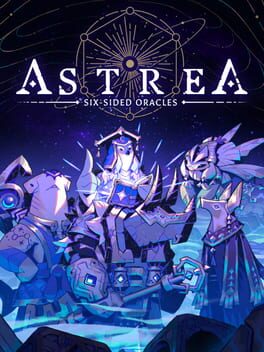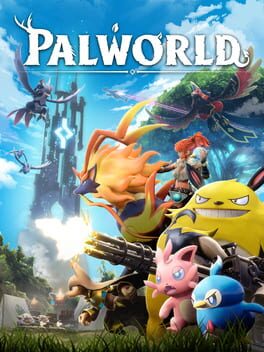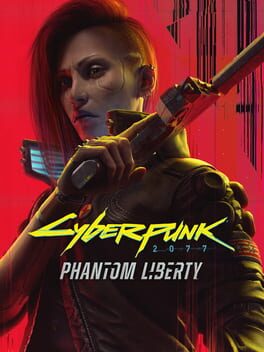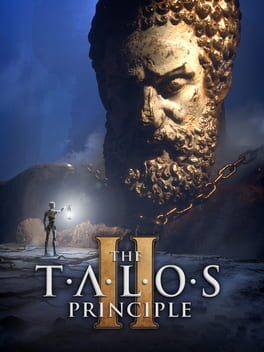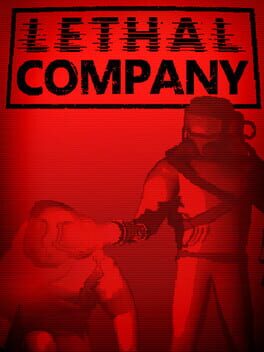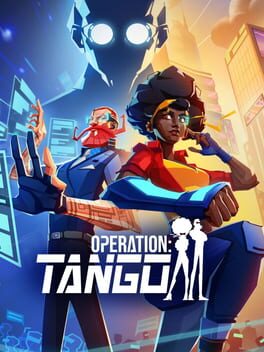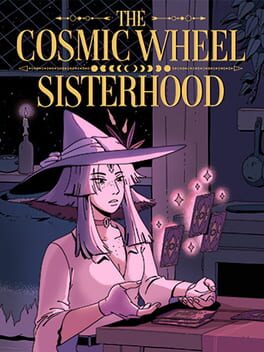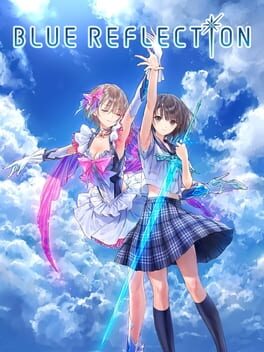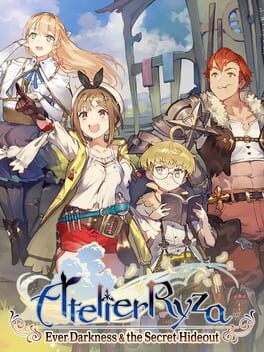Starsworn
The logical extreme of deckbuilding roguelikes, Astrea is an incredibly solid game which knows its audience and doesn't shy away from the complexity. It's engaging, and demands your attention- sometimes too much so, making it somewhat difficult to play for long periods- but at it's core is pure tactical bliss.
2024
2024
2024
Phantom Liberty- and by extension, the 2.0 update to the base game- takes the diamond in the rough that was Cyberpunk: 2077 and polishes it to a pristine shine. This is what we should have had on release, but it's still been worth the wait. A one-of-a-kind experience and a must play for fans of the cyberpunk genre, open-world adventures, or first-person action games.
2023
2021
This review contains spoilers
The Cosmic Wheel Sisterhood is a charming mix of visual novel, political drama, and artist toolkit that tells the story of a coven of space witches. The player character, Fortuna, is exiled for forecasting the destruction of the coven, and is exiled for a millennia. Desperate, Fortuna makes a pact with an elder demon, exchanging either their immortality, loved ones, or the rest of their coven in exchange for the ability to create a new divination deck that allows them to grasp the full extent of their power to write the future and define the past.
In gameplay terms, you manage your resources needed to create new major arcana for a tarot-style deck and perform readings for the colorful cast of characters who come to visit you during your exile, which grants you more resources. Your readings always come true, and regardless of what cards you draw, you can usually find a way to tip the scales of fate in your favor. But this doesn’t always make things better; as when the leader of the coven dies, a general election is called that will result in you (likely) running for office for Witch President, running against your two “best friends”, who are caricatures of communists and conservatives. The last half of the game sees you managing your campaign in addition to your witch energies and culminates in an impressive ending sequence where the fate of your coven is determined and a leader is chosen while the fate of the world hangs in the balance. But then, the terms of your pact are invoked, and your sacrifice is made. Unless you go for the hyper-fascist power ascension ending in which you literally become God to reshape the universe as you see fit, Fortuna takes her agency back from the player and is always unhappy with the outcome. In my first playthrough, I used my powers to win the election, so I could guarantee that my policies (some of which I felt were right but unfavorable) would be put into place, but I had chosen to sacrifice my immortality at the beginning of the game (which I saw as a blessing; as immortality would surely be a curse, even in fantasy space witch world). So, my Fortuna returned to Earth to live out life as a mortal, and I was given no option to simply accept or (gasp) enjoy this ending, instead going into a time loop where you’re given the prompt to make different choices and eventually usurp God. :/
Also, this game is political in a social commentary way rather than just a philosophical one. And I felt it was both too ham-fisted and too silly. No men have ever become witches, but non-binary people and trans women (but NOT trans men) can. Which is whatever, it’s a silly game and who cares. But it feels like no one is happy with this- not men, not trans men, and not people who generally support equality rather than just man-bashing. Also, the game features entirely too much conversation about sex and drug use in a way that does not make interesting commentary on either theme; neither does it advance the plot in any meaningful way. It reads as complete virtue signaling and should have been cut.
I liked the card editor. I’m going to use it for my next D&D campaign. Fun game, great art, interesting story, milquetoast politics and heavy-handed virtue signaling. Games from this studio (previously, The Red Strings Club) have routinely been worthwhile experiences that utilize interesting gameplay mechanics in their storytelling.
In gameplay terms, you manage your resources needed to create new major arcana for a tarot-style deck and perform readings for the colorful cast of characters who come to visit you during your exile, which grants you more resources. Your readings always come true, and regardless of what cards you draw, you can usually find a way to tip the scales of fate in your favor. But this doesn’t always make things better; as when the leader of the coven dies, a general election is called that will result in you (likely) running for office for Witch President, running against your two “best friends”, who are caricatures of communists and conservatives. The last half of the game sees you managing your campaign in addition to your witch energies and culminates in an impressive ending sequence where the fate of your coven is determined and a leader is chosen while the fate of the world hangs in the balance. But then, the terms of your pact are invoked, and your sacrifice is made. Unless you go for the hyper-fascist power ascension ending in which you literally become God to reshape the universe as you see fit, Fortuna takes her agency back from the player and is always unhappy with the outcome. In my first playthrough, I used my powers to win the election, so I could guarantee that my policies (some of which I felt were right but unfavorable) would be put into place, but I had chosen to sacrifice my immortality at the beginning of the game (which I saw as a blessing; as immortality would surely be a curse, even in fantasy space witch world). So, my Fortuna returned to Earth to live out life as a mortal, and I was given no option to simply accept or (gasp) enjoy this ending, instead going into a time loop where you’re given the prompt to make different choices and eventually usurp God. :/
Also, this game is political in a social commentary way rather than just a philosophical one. And I felt it was both too ham-fisted and too silly. No men have ever become witches, but non-binary people and trans women (but NOT trans men) can. Which is whatever, it’s a silly game and who cares. But it feels like no one is happy with this- not men, not trans men, and not people who generally support equality rather than just man-bashing. Also, the game features entirely too much conversation about sex and drug use in a way that does not make interesting commentary on either theme; neither does it advance the plot in any meaningful way. It reads as complete virtue signaling and should have been cut.
I liked the card editor. I’m going to use it for my next D&D campaign. Fun game, great art, interesting story, milquetoast politics and heavy-handed virtue signaling. Games from this studio (previously, The Red Strings Club) have routinely been worthwhile experiences that utilize interesting gameplay mechanics in their storytelling.
2020
This review contains spoilers
The Nier Replicant remake is such a bizarre game. I want so badly to like it. It has many of my favorite things in gaming: excellent art direction, music, English vocal performances, and character designs. It’s a shame, then, that the actual game is so poorly paced and boring. For reference, I got my playstation 5 a little over a year ago, and I tried playing the game then. What I encountered was a bizarrely anachronistic action game that felt very similar to NieR: Automata- shocker- but that lacked its tour de force opening. As such, I played the game for about five hours, being strung along by meeting series legend Kaine and listening to the dulcet tones of Liam O’Brien as Weiss. Eden Riegel, who plays Devola and Popola, is my favorite voice actress ever. But the game itself was just… boring. The action combat was bot too difficult and too limp; the tools given to you out of the gate are same-y and lack a lot of weight. Enemy variety is minimal and their attacks are nonthreatening; combat just isn’t very satisfying. This is perhaps amplified by my having just finished FFXVI, but Platinum Games is known for being the modern action studio- they literally helped develop FFXVI!
Okay, so the combat isn’t to my taste. That’s fine. There’s an autobattle mode like there is in Automata to help players that either aren’t looking to be challenged by the game or that aren’t interested in the game’s combat beyond what it offers as a spectacle. So, I beelined the main story for another couple of hours.
Then I noticed how many side quests I was getting. So I looked up which of the sidequests were worth doing, according to the fanbase. There were some absolutely great sidequests in Automata, so I figured there would be somewhere between 8-10 sidequests that would be worth my while and the rest are mostly there to build out the world, help stabilize the player’s progression curve, and pad runtime.
Then I found out that 3/5 of the game’s endings, including the new ending exclusive to the remake, are tied to collecting all 33 weapons, some of which are missable, and one of which I had already missed. Keep in mind, Nier games are meant to be replayed many times, with Automata having several playthroughs of the same content (from different perspectives, granted) and generally being comfortable with sending the player down a rabbit hole of metatextual interaction. That’s what you signed up for with a Yoko Taro game, I get that. But the thought of playing through the game’s painfully slow opening again, losing the entirety of my progress (I had been saving in only one slot, which is regrettably a cardinal sin) made me immediately jump ship.
So, here’s where I stand: I am not a “gameplay is king” kind of person. Games can be interactive stories, and all that is required for interactivity is player control/agency. Games are different from novels, which also can require you to “interact” by flipping the page in the same way a player can press a button to advance a text box, but where games differ is in their presentation (obviously) and by the player acting as the director and curator of their experience. They choose the camera angles, the zoom distance, how long they linger in the town square to listen to the music, how many sidequests they do, how long they spend fishing. But in order to convince the player to engage with your story, you enter a contract with them: “I won’t waste your time, so please trust in the experience we want you to have.”
I thoroughly expect NieR Replicant to have a phenomenal story. I intend on watching a no-commentary supercut of the game to experience the story. I imagine I will be quite happy I will have done so looking back, not least because NieR Replicant is… a bad game.
I am not going to rate the game. It doesn’t feel right to give it a rating when i’m giving up on the gameplay element of the game after only about 10% of its runtime. But the gameplay would be close to a 5, maybe. It’s got spectacle, and it runs without performance hiccups. It’s serviceable.
I will report back on the story after I finish.
I’m finished. The story felt incomplete. Perhaps Replicant walked so Automata could run. The Yoko Taro Tricks ™ are less effective the second time. That said, I really enjoyed the extra content about the White Chlorination Syndrome and the aftermath of Drakengard Ending E. That whole section was really cool. Overall, the story did about what I expected to and did it well. It’d be like an 8/10. But again, not going to rate it because i didn’t really play it.
Okay, so the combat isn’t to my taste. That’s fine. There’s an autobattle mode like there is in Automata to help players that either aren’t looking to be challenged by the game or that aren’t interested in the game’s combat beyond what it offers as a spectacle. So, I beelined the main story for another couple of hours.
Then I noticed how many side quests I was getting. So I looked up which of the sidequests were worth doing, according to the fanbase. There were some absolutely great sidequests in Automata, so I figured there would be somewhere between 8-10 sidequests that would be worth my while and the rest are mostly there to build out the world, help stabilize the player’s progression curve, and pad runtime.
Then I found out that 3/5 of the game’s endings, including the new ending exclusive to the remake, are tied to collecting all 33 weapons, some of which are missable, and one of which I had already missed. Keep in mind, Nier games are meant to be replayed many times, with Automata having several playthroughs of the same content (from different perspectives, granted) and generally being comfortable with sending the player down a rabbit hole of metatextual interaction. That’s what you signed up for with a Yoko Taro game, I get that. But the thought of playing through the game’s painfully slow opening again, losing the entirety of my progress (I had been saving in only one slot, which is regrettably a cardinal sin) made me immediately jump ship.
So, here’s where I stand: I am not a “gameplay is king” kind of person. Games can be interactive stories, and all that is required for interactivity is player control/agency. Games are different from novels, which also can require you to “interact” by flipping the page in the same way a player can press a button to advance a text box, but where games differ is in their presentation (obviously) and by the player acting as the director and curator of their experience. They choose the camera angles, the zoom distance, how long they linger in the town square to listen to the music, how many sidequests they do, how long they spend fishing. But in order to convince the player to engage with your story, you enter a contract with them: “I won’t waste your time, so please trust in the experience we want you to have.”
I thoroughly expect NieR Replicant to have a phenomenal story. I intend on watching a no-commentary supercut of the game to experience the story. I imagine I will be quite happy I will have done so looking back, not least because NieR Replicant is… a bad game.
I am not going to rate the game. It doesn’t feel right to give it a rating when i’m giving up on the gameplay element of the game after only about 10% of its runtime. But the gameplay would be close to a 5, maybe. It’s got spectacle, and it runs without performance hiccups. It’s serviceable.
I will report back on the story after I finish.
I’m finished. The story felt incomplete. Perhaps Replicant walked so Automata could run. The Yoko Taro Tricks ™ are less effective the second time. That said, I really enjoyed the extra content about the White Chlorination Syndrome and the aftermath of Drakengard Ending E. That whole section was really cool. Overall, the story did about what I expected to and did it well. It’d be like an 8/10. But again, not going to rate it because i didn’t really play it.
2023
The single best action RPG i have ever played. A phenomenal entry into the legendary Final Fantasy series, replete with brilliancies in gameplay, atmosphere, music, character design, writing, vocal performance, and animation quality. The romance between Clive and Jill is one of the best-written romances in all of gaming and deserves special notice. Cidolfus is one of the sharpest strengths of the entire franchise and deserves all the attention he gets. There are almost no blemishes on this masterpiece of a game- with only one memorable fumble around the midway point. While there are few blemishes, there are some elements of the game which could have been more fleshed out, such as magic attacks and basic combos feeling too much like filler moments in combat. Taken as a whole, FF16 vindicates early adopters of the PS5 and delivers one of the best console games of the entire generation. 10/10.
Where has this franchise been all my life? Yakuza 7 is a very solid game all around, with a refreshing blend of levity and sincerity. The organized crime drama thriller and the comedy work to create a memorable experience. The combat system is tight, flexible, and generally balanced. The game’s side content feeds nicely into the main experience and provides cohesion as a whole. The writing and acting performances of the main cast are stunning. The ending especially was incredibly well-executed and rewarding without being unrealistically happy.
The business side-game was really fun, if a little easy (Which i was happy about). Most of the other side content has some replayability but are mostly there as distractions, which I actually like. It’s there to engage with if you want to, and not if you don’t. I hated the kart racer and the can collector, so I skipped those. I loved the business mode, so I did that. I played a few rounds of golf and used the batting cages. I completed every single vocational certificate.
I have only a few gripes about the game which unfortunately seriously damaged its rating in my eyes.
1. The ridiculous 15-level jump in midgame. While doing most side content and not running from any random encounters, I entered chapter 12 at level 38. The boss of Chapter 12 was level 50. I had no intention of grinding 12-15 levels. This was the most egregious error the game makes, bar none.
2. Bosses were complete sponges with very little to offer in terms of strategic depth after an initial learning curve. After learning their attack patterns, which weaknesses they have, and what debuffs to apply, the game is resolved and all you can do is dump your SP into them and refresh your mana endlessly with items. This was irritating but not more than I could handle.
Excited to play Yakuza 0. That’ll be fun.
The business side-game was really fun, if a little easy (Which i was happy about). Most of the other side content has some replayability but are mostly there as distractions, which I actually like. It’s there to engage with if you want to, and not if you don’t. I hated the kart racer and the can collector, so I skipped those. I loved the business mode, so I did that. I played a few rounds of golf and used the batting cages. I completed every single vocational certificate.
I have only a few gripes about the game which unfortunately seriously damaged its rating in my eyes.
1. The ridiculous 15-level jump in midgame. While doing most side content and not running from any random encounters, I entered chapter 12 at level 38. The boss of Chapter 12 was level 50. I had no intention of grinding 12-15 levels. This was the most egregious error the game makes, bar none.
2. Bosses were complete sponges with very little to offer in terms of strategic depth after an initial learning curve. After learning their attack patterns, which weaknesses they have, and what debuffs to apply, the game is resolved and all you can do is dump your SP into them and refresh your mana endlessly with items. This was irritating but not more than I could handle.
Excited to play Yakuza 0. That’ll be fun.
2017
This review contains spoilers
Continuing on my binge of AA JRPGs, Blue Reflection is a game surprisingly similar to Persona in its setting, themes, and gameplay. You play as one Hinako Shirai, a former ballerina whose career is cut short due to injury. Through a twist of fate, Hinako becomes a Reflector, something described even in-universe as a magical girl a la Sailor Moon. Your task is to enter the Metaverse Common and steal hearts stabilize rampant Fragments to protect the world from Yaldabaoth Sephira. Combat uses a turn-based system actually very similar to Atelier Ryza, in which there is an action timeline which pauses whenever someone reaches the center and then performs an action. I like this combat better than Ryza’s, however, because it does exactly what I suggested it should do and pause the game for everyone’s turns.
Combat is SMT-styled with characters using skills with unique affinities to hit enemy weak points for big damage. A second resource, Ether, allows for the use of All Out Attacks Overdrives and is accumulated by special attacks or guarding. It’s enjoyable and fairly simple. It is, however, laughably easy and terribly repetitive.
Why is this the case? Because of the structure of the rest of the game. Each chapter until about 3/4ths the way through the game, a new girl is introduced, you do some mandatory sidequests, and then you confront the main girl’s problems by stealing her heart and stabilizing her emotions. Wash, rinse, and repeat 12 times. This loop is fine- it works well for persona 5- but the pacing required is awful. See, in persona, time is a limited resource, and so managing time becomes an important skill. In Blue Reflection, time essentially pauses whenever you’re on a free day, so you can grind out the friendship levels of any/all of the girls. This system is optional anyways, so that sounds fine- until you realize that grinding friendship ranks gives you combat levels. This is in fact the best and only way to grind for combat levels. Me, being interested in this game for the characters and story, grinded through every single girl’s content as fast as possible. As such, I trivialized the combat during story sections but was still required to finish the mandatory sidequests the game put in place to prevent players from being underleveled. These mandatory sidequests require you to have a certain combat level and a certain number of sidequest points. I was quickly 10+ over the level required for these progression checks but was barely slinking by on sidequests points, because they were incredible wastes of time. No voiced dialogue, no interesting changes to the core gameplay loop, and no reward for doing them besides being able to progress the main story.
So, around the time i had to needlessly grind for the 8th time, I dropped the game and watched a no-commentary playthrough of the game on YouTube to finish the story. So, how was the story?
It was good. Nothing special, though. I was hoping that there would be proper yuri romance in this game considering how obviously influenced by the yuri genre it is, and there wasn’t. Fine, but disappointing. The mysterious nature of the sisters was well-developed, but I dislike the Sixth Sense plot twist and would have preferred that the sisters were the true villains if only because it would have been more interesting both on a narrative and gameplay level (especially because my Hinako was solo carrying every fight anyways).
Mao as a villain had a surprising amount of potential, but she felt like she should have been the first villain and then the rest would have become more threatening from there. The Sephira are incredibly flat as villains and are basically non-factors to the story except to move things along.
I’m excited for the sequel and I’ve heard there’s an anime. Here’s what I wish BR1 would have done differently and what I hope the sequel does:
- More enemy variety
- Access to the full suite of combat controls earlier
- More playable characters/Supporters in every battle
- No mandatory sidequests
- Improved level design for the Common
- Yuri Romance (this one’s a stretch, ik)
- Scrap the crafting system and have fragment progression dependent on friendship level
- Time management
Music do be banging tho. My man’s hitting the sickest Amen Break of his life in the boss track. The voice acting is neat and the graphics are serviceable.
Yuri best girl. Tennis-chan worst girl. Most girls fairly mid.
Combat is SMT-styled with characters using skills with unique affinities to hit enemy weak points for big damage. A second resource, Ether, allows for the use of All Out Attacks Overdrives and is accumulated by special attacks or guarding. It’s enjoyable and fairly simple. It is, however, laughably easy and terribly repetitive.
Why is this the case? Because of the structure of the rest of the game. Each chapter until about 3/4ths the way through the game, a new girl is introduced, you do some mandatory sidequests, and then you confront the main girl’s problems by stealing her heart and stabilizing her emotions. Wash, rinse, and repeat 12 times. This loop is fine- it works well for persona 5- but the pacing required is awful. See, in persona, time is a limited resource, and so managing time becomes an important skill. In Blue Reflection, time essentially pauses whenever you’re on a free day, so you can grind out the friendship levels of any/all of the girls. This system is optional anyways, so that sounds fine- until you realize that grinding friendship ranks gives you combat levels. This is in fact the best and only way to grind for combat levels. Me, being interested in this game for the characters and story, grinded through every single girl’s content as fast as possible. As such, I trivialized the combat during story sections but was still required to finish the mandatory sidequests the game put in place to prevent players from being underleveled. These mandatory sidequests require you to have a certain combat level and a certain number of sidequest points. I was quickly 10+ over the level required for these progression checks but was barely slinking by on sidequests points, because they were incredible wastes of time. No voiced dialogue, no interesting changes to the core gameplay loop, and no reward for doing them besides being able to progress the main story.
So, around the time i had to needlessly grind for the 8th time, I dropped the game and watched a no-commentary playthrough of the game on YouTube to finish the story. So, how was the story?
It was good. Nothing special, though. I was hoping that there would be proper yuri romance in this game considering how obviously influenced by the yuri genre it is, and there wasn’t. Fine, but disappointing. The mysterious nature of the sisters was well-developed, but I dislike the Sixth Sense plot twist and would have preferred that the sisters were the true villains if only because it would have been more interesting both on a narrative and gameplay level (especially because my Hinako was solo carrying every fight anyways).
Mao as a villain had a surprising amount of potential, but she felt like she should have been the first villain and then the rest would have become more threatening from there. The Sephira are incredibly flat as villains and are basically non-factors to the story except to move things along.
I’m excited for the sequel and I’ve heard there’s an anime. Here’s what I wish BR1 would have done differently and what I hope the sequel does:
- More enemy variety
- Access to the full suite of combat controls earlier
- More playable characters/Supporters in every battle
- No mandatory sidequests
- Improved level design for the Common
- Yuri Romance (this one’s a stretch, ik)
- Scrap the crafting system and have fragment progression dependent on friendship level
- Time management
Music do be banging tho. My man’s hitting the sickest Amen Break of his life in the boss track. The voice acting is neat and the graphics are serviceable.
Yuri best girl. Tennis-chan worst girl. Most girls fairly mid.
This review contains spoilers
Atelier Ryza is the best place to start the fabled Atelier series of RPGs. Having tried to play the other most commonly touted entrance place, Atelier Rorona, and failing at least three times, this entry has more to offer in terms of gameplay, story, and polish than Rorona does.
Ryza, at its core, is a gathering/crafting game with some combat and story tacked on as a fun diversion. You play as an aspiring alchemist who is quickly wrapped up in a coming-of-age story with your three best friends and a colorful cast of supporting characters. The story is cutesy, simple, and uncomplicated. The combat is a strange hybrid of heyday FF and the Trails series, with the player needing to manage a tension gauge, ATB bars, and item uses. While this system initially showed promise, around the 20 hour mark, it was clear that all combat would be for Ryza was a series of stat checks. There is no incentive to spend your action points on anything but increasing your tension gauge unless you are using an interrupt action to stun a boss- if you’re having to use AP any other way, you’re likely behind the stat check curve and are going to lose anyways. Only being able to realistically juggle one character is frustrating; it would have been nice if every time a player character’s turn rolled around in the order, the flow of time would stop for the player to manually input that character’s attack. Not being able to easily or directly control NPC party members has always been a gripe of mine ever since playing Persona 3.
Regardless, the core loop of exploring new places to get new crafting materials to make new items and improve your weapons, armor, and accessories is rock-solid and crafting broken consumable items is a blast. If Ryza either scaled combat difficulty to the player’s level or gave the player a level indicator for a region, there’d be less frustration. Overall, Ryza is a good way to zone out and enjoy some anime-flavored filler, and that’s enough to warrant a solid middle B in my book. After hitting a wall vs. the second to last boss, I just watched a supercut of Takanashi Kiara play through the rest of the game and got just as much fun as I would have grinding the game out for myself. The best part of my playthrough was definitely going infinite in the crafting and mass-producing 999 quality items.
Ryza, at its core, is a gathering/crafting game with some combat and story tacked on as a fun diversion. You play as an aspiring alchemist who is quickly wrapped up in a coming-of-age story with your three best friends and a colorful cast of supporting characters. The story is cutesy, simple, and uncomplicated. The combat is a strange hybrid of heyday FF and the Trails series, with the player needing to manage a tension gauge, ATB bars, and item uses. While this system initially showed promise, around the 20 hour mark, it was clear that all combat would be for Ryza was a series of stat checks. There is no incentive to spend your action points on anything but increasing your tension gauge unless you are using an interrupt action to stun a boss- if you’re having to use AP any other way, you’re likely behind the stat check curve and are going to lose anyways. Only being able to realistically juggle one character is frustrating; it would have been nice if every time a player character’s turn rolled around in the order, the flow of time would stop for the player to manually input that character’s attack. Not being able to easily or directly control NPC party members has always been a gripe of mine ever since playing Persona 3.
Regardless, the core loop of exploring new places to get new crafting materials to make new items and improve your weapons, armor, and accessories is rock-solid and crafting broken consumable items is a blast. If Ryza either scaled combat difficulty to the player’s level or gave the player a level indicator for a region, there’d be less frustration. Overall, Ryza is a good way to zone out and enjoy some anime-flavored filler, and that’s enough to warrant a solid middle B in my book. After hitting a wall vs. the second to last boss, I just watched a supercut of Takanashi Kiara play through the rest of the game and got just as much fun as I would have grinding the game out for myself. The best part of my playthrough was definitely going infinite in the crafting and mass-producing 999 quality items.
